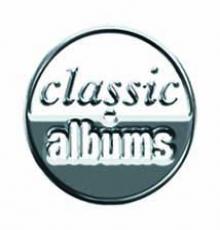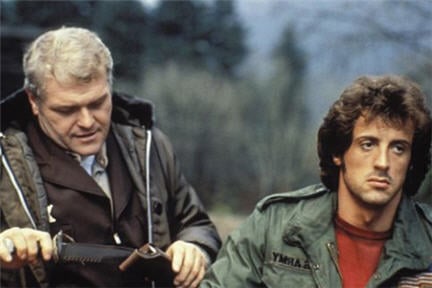15. Goodfellas (1990), dir. Martin Scorsese
Strange as it may seem, I didn’t really like this film when I first saw it. Don’t know why, because it has become my favorite Scorsese film (which says a lot, I really like most of his movies). Yes, it is a mob film, but it also presents a way of life through several decades. Scorsese became famous for dramatic, unbroken camera shots (much imitated), and that is really because of this film. It is the peak of the “Scorsese style.” Robert De Niro is predictably great, but Ray Liotta’s mob everyman Henry Hill and Joe Pesci’s psychopath Tommy DeVito really steal the show. Scorsese was one of the pioneers of using pop music in his movies (all the way back to Mean Streets in the early 70’s) vs. a traditional musical score, and he is masterful here (the cocaine-fueled scene of paranoia near the end done to The Rolling Stones’ “Monkey Man”? Oh man, that is so brilliant.) This is all based on a true story too.
ABOVE: Want to see masterful cinematography? This is one of Scorsese’s most famous shots in any movie; a thrilling three minutes where there is not a single cut. It is all done in one shot.
14. The Graduate (1967), dir. Mike Nichols
This is deservedly a watershed film. Dustin Hoffman’s Benjamin Braddock represented a generation’s rejection of its parents’ values. Benjamin wasn’t a 60’s radical or hippie, he was a person who still maintained all outward appearances of a clean cut young man on the rise. But inside, the type of life his parents and their friends found fulfilling (or did they really? Just ask Mrs. Robinson) cannot satisfy. He wants more, but crucially he has no idea what that “more” really is. Telling is the final scene in the film, where Ben seemingly has what and who he wants; he and Elaine (Katherine Ross) are riding off on the bus laughing at what just happened. But the last shot is not Ben laughing and smiling, the shot stays on Ben just long enough to show his smile fade a little bit, as if to ask, “now what?” Quite apart from all of the deep meanings, The Graduate is also very funny and revolutionary in its visual style and wonderful use of the Simon & Garfunkel soundtrack. I think all modern young people go through a Ben Braddock period (well, maybe not the sleeping with Anne Bancroft part) where despite outward success, they still feel unfulfilled in some way.
ABOVE: The generation gap is represented here in this famous scene.
ABOVE: "Mrs. Robinson, you're trying to seduce me. Aren't you?"
13. Raising Arizona (1987), dir. Joel Coen
This is still the greatest of all Coen Brothers triumphs. One of those movies where every line is funny to me at this point. For once, the awkward goofiness/sincerity of Nicholas Cage is perfectly suited to a role. This is here on my list purely for the writing, some of the sharpest and funniest dialogue I’ve ever come across.
ABOVE: Siskel & Ebert disagreed over Raising Arizona's merits. I obviously agree with Siskel
12. Casablanca (1942), dir. Michael Curtiz
What is interesting about this undeniable classic is that when it was put together, nobody thought that they were making a lasting piece of art. It went through several writers, sometimes writing and changing scenes on set on the day of filming them. At the time Humphrey Bogart himself dismissed what would become his most iconic character as just another forgettable film hero among many. But somehow the stars were aligned and a classic film was born. Bogart is at his swarthy best, but all of the characters are great, even the minor ones. Claude Raines is wonderful as the opportunistic French chief of police who seems to have loyalty to no one but his own pocketbook. What strikes me is that the dialogue still holds up today as witty and fast. Most films of that era do not age (dialogue-wise) this smoothly. The funny parts are still genuinely funny, and the touching parts are still genuinely touching. And you can understand why a man would lose his way after letting Ingrid Bergman slip through his fingers. Finally, the film captures the exciting, corrupt, seamy atmosphere of a place like Casablanca during World War II.
ABOVE: "I'm shocked! Shocked that gambling is going on in here."
11. The Empire Strikes Back (1980), dir. Irvin Kershner
It is no coincidence that the best of the entire Star Wars series was one of the two films not directed by George Lucas. He may be good with the big ideas, but he is a horrible director, and writes the clunkiest dialogue imaginable (just watch the recent trilogy for evidence of what too much Lucas can do). Empire was the middle episode in the original trilogy, so it served as a bridge between the beginning and the end. It was the darkest of the originals, and the one where Darth Vader became one of the greatest villains in film history (before he was revealed to be a whiny child in the new trilogy). Yoda first appears here, pre-CGI and pre-jumping around with a lightsaber. Can you tell I have a problem with the newer Star Wars films? Yoda, the Hoth ice planet, Boba Fett, asteroid field chase, killer lightsaber duel (pre-CGI), the best Han Solo scenes, smooth as a cold 40 Lando, carbonite, one of the most shocking revelations in all movies (which was rendered impotent by showing Luke’s birth in Revenge of the Sith…argh!) This one was the best.

ABOVE: I always liked the Empire Strikes Back film poster (original)

























